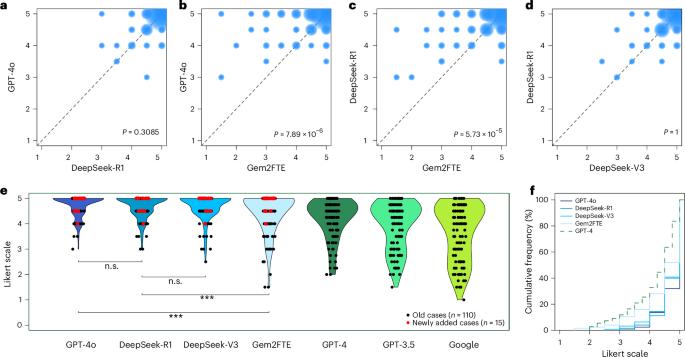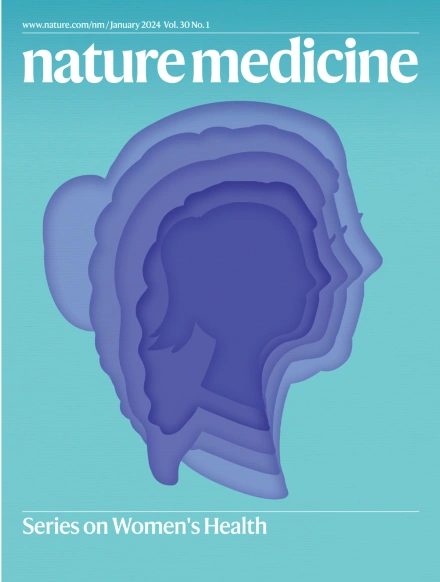Benchmark evaluation of DeepSeek large language models in clinical decision-making
IF 50
1区 医学
Q1 BIOCHEMISTRY & MOLECULAR BIOLOGY
引用次数: 0
Abstract
Large language models (LLMs) are increasingly transforming medical applications. However, proprietary models such as GPT-4o face significant barriers to clinical adoption because they cannot be deployed on site within healthcare institutions, making them noncompliant with stringent privacy regulations. Recent advancements in open-source LLMs such as DeepSeek models offer a promising alternative because they allow efficient fine-tuning on local data in hospitals with advanced information technology infrastructure. Here, to demonstrate the clinical utility of DeepSeek-V3 and DeepSeek-R1, we benchmarked their performance on clinical decision support tasks against proprietary LLMs, including GPT-4o and Gemini-2.0 Flash Thinking Experimental. Using 125 patient cases with sufficient statistical power, covering a broad range of frequent and rare diseases, we found that DeepSeek models perform equally well and in some cases better than proprietary LLMs. Our study demonstrates that open-source LLMs can provide a scalable pathway for secure model training enabling real-world medical applications in accordance with data privacy and healthcare regulations. In an evaluation involving 125 standardized patient cases, open-source DeepSeek large language models are shown to perform at least on par with state-of-the-art proprietary large language models in diagnosis and treatment recommendation tasks.

DeepSeek大型语言模型在临床决策中的基准评价
大型语言模型(LLM)正在日益改变医疗应用。然而,GPT-4o 等专有模型在临床应用中面临巨大障碍,因为它们无法在医疗机构内现场部署,因而不符合严格的隐私法规。DeepSeek 模型等开源 LLM 的最新进展提供了一个很有前景的替代方案,因为它们可以在拥有先进 IT 基础设施的医院中对本地数据进行高效微调。为了证明DeepSeek-V3和DeepSeek-R1的临床实用性,我们将它们在临床决策支持任务中的表现与专有LLM(包括GPT-4o和Gemini-2.0 Flash Thinking Experimental)进行了对比。我们使用了125个具有足够统计能力的患者病例,涵盖了广泛的常见病和罕见病,发现DeepSeek模型的表现同样出色,在某些情况下甚至优于专有LLM。我们的研究表明,开源 LLM 可以为安全模型训练提供可扩展的途径,从而在符合数据隐私和医疗保健法规的前提下实现真实世界的医疗应用。
本文章由计算机程序翻译,如有差异,请以英文原文为准。
求助全文
约1分钟内获得全文
求助全文
来源期刊

Nature Medicine
医学-生化与分子生物学
CiteScore
100.90
自引率
0.70%
发文量
525
审稿时长
1 months
期刊介绍:
Nature Medicine is a monthly journal publishing original peer-reviewed research in all areas of medicine. The publication focuses on originality, timeliness, interdisciplinary interest, and the impact on improving human health. In addition to research articles, Nature Medicine also publishes commissioned content such as News, Reviews, and Perspectives. This content aims to provide context for the latest advances in translational and clinical research, reaching a wide audience of M.D. and Ph.D. readers. All editorial decisions for the journal are made by a team of full-time professional editors.
Nature Medicine consider all types of clinical research, including:
-Case-reports and small case series
-Clinical trials, whether phase 1, 2, 3 or 4
-Observational studies
-Meta-analyses
-Biomarker studies
-Public and global health studies
Nature Medicine is also committed to facilitating communication between translational and clinical researchers. As such, we consider “hybrid” studies with preclinical and translational findings reported alongside data from clinical studies.
 求助内容:
求助内容: 应助结果提醒方式:
应助结果提醒方式:


